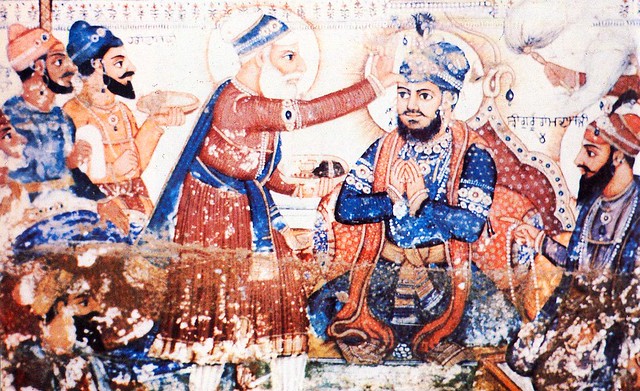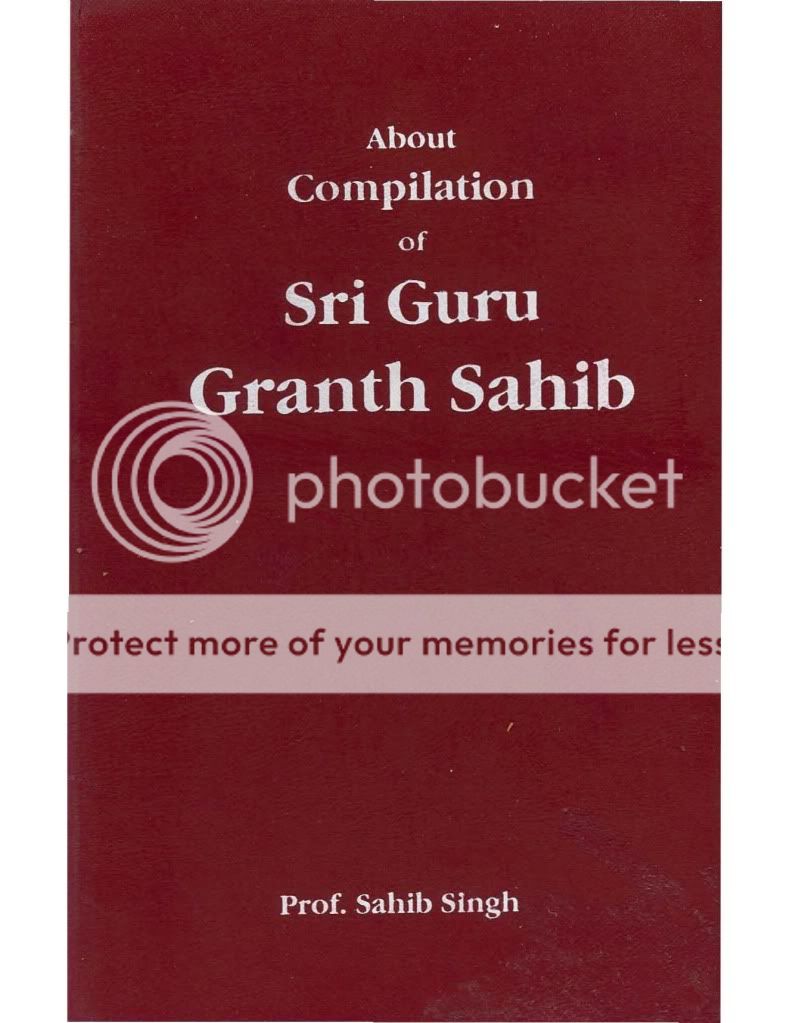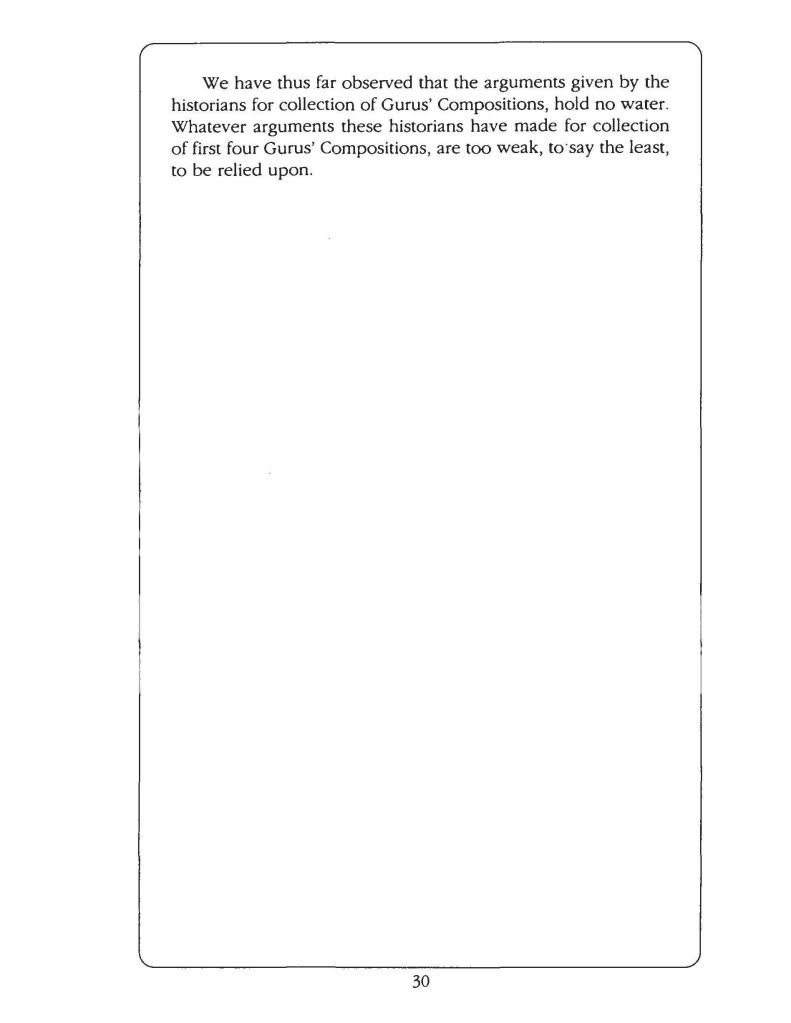- May 9, 2006
- 3,261
- 5,193
Sri Guru Granth Sahib Ji Ang 248:
ਗਉੜੀ ਮਹਲਾ ੫ ॥
Ga▫oṛī mėhlā 5.
Gauree, Fifth Mehl:
ਮੋਹਨ ਤੇਰੇ ਊਚੇ ਮੰਦਰ ਮਹਲ ਅਪਾਰਾ ॥
Mohan ṯere ūcẖe manḏar mahal apārā.
O Mohan, your temple is so lofty, and your mansion is unsurpassed.
ਮੋਹਨ ਤੇਰੇ ਸੋਹਨਿ ਦੁਆਰ ਜੀਉ ਸੰਤ ਧਰਮ ਸਾਲਾ ॥
Mohan ṯere sohan ḏu▫ār jī▫o sanṯ ḏẖaram sālā.
O Mohan, your gates are so beautiful. They are the worship-houses of the Saints.
ਧਰਮ ਸਾਲ ਅਪਾਰ ਦੈਆਰ ਠਾਕੁਰ ਸਦਾ ਕੀਰਤਨੁ ਗਾਵਹੇ ॥
Ḏẖaram sāl apār ḏai▫ār ṯẖākur saḏā kīrṯan gāvhe.
In these incomparable worship-houses, they continually sing Kirtan, the Praises of their Lord and Master.
ਜਹ ਸਾਧ ਸੰਤ ਇਕਤ੍ਰ ਹੋਵਹਿ ਤਹਾ ਤੁਝਹਿ ਧਿਆਵਹੇ ॥
Jah sāḏẖ sanṯ ikaṯar hovėh ṯahā ṯujẖėh ḏẖi▫āvhe.
Where the Saints and the Holy gather together, there they meditate on you.
ਕਰਿ ਦਇਆ ਮਇਆ ਦਇਆਲ ਸੁਆਮੀ ਹੋਹੁ ਦੀਨ ਕ੍ਰਿਪਾਰਾ ॥
Kar ḏa▫i▫ā ma▫i▫ā ḏa▫i▫āl su▫āmī hohu ḏīn kirpārā.
Be Kind and Compassionate, O Merciful Lord; be Merciful to the meek.
ਬਿਨਵੰਤਿ ਨਾਨਕ ਦਰਸ ਪਿਆਸੇ ਮਿਲਿ ਦਰਸਨ ਸੁਖੁ ਸਾਰਾ ॥੧॥
Binvanṯ Nānak ḏaras pi▫āse mil ḏarsan sukẖ sārā. ||1||
Prays Nanak, I thirst for the Blessed Vision of Your Darshan; receiving Your Darshan, I am totally at peace. ||1||
ਮੋਹਨ ਤੇਰੇ ਬਚਨ ਅਨੂਪ ਚਾਲ ਨਿਰਾਲੀ ॥
Mohan ṯere bacẖan anūp cẖāl nirālī.
O Mohan, your speech is incomparable; wondrous are your ways.
ਮੋਹਨ ਤੂੰ ਮਾਨਹਿ ਏਕੁ ਜੀ ਅਵਰ ਸਭ ਰਾਲੀ ॥
Mohan ṯūʼn mānėh ek jī avar sabẖ rālī.
O Mohan, you believe in the One. Everything else is dust to you.
ਮਾਨਹਿ ਤ ਏਕੁ ਅਲੇਖੁ ਠਾਕੁਰੁ ਜਿਨਹਿ ਸਭ ਕਲ ਧਾਰੀਆ ॥
Mānėh ṯa ek alekẖ ṯẖākur jinėh sabẖ kal ḏẖārī▫ā.
You adore the One Lord, the Unknowable Lord and Master; His Power gives Support to all.
ਤੁਧੁ ਬਚਨਿ ਗੁਰ ਕੈ ਵਸਿ ਕੀਆ ਆਦਿ ਪੁਰਖੁ ਬਨਵਾਰੀਆ ॥
Ŧuḏẖ bacẖan gur kai vas kī▫ā āḏ purakẖ banvārī▫ā.
Through the Guru's Word, you have captured the heart of the Primal Being, the Lord of the World.
ਤੂੰ ਆਪਿ ਚਲਿਆ ਆਪਿ ਰਹਿਆ ਆਪਿ ਸਭ ਕਲ ਧਾਰੀਆ ॥
Ŧūʼn āp cẖali▫ā āp rahi▫ā āp sabẖ kal ḏẖārī▫ā.
You Yourself move, and You Yourself stand still; You Yourself support the whole creation.
ਬਿਨਵੰਤਿ ਨਾਨਕ ਪੈਜ ਰਾਖਹੁ ਸਭ ਸੇਵਕ ਸਰਨਿ ਤੁਮਾਰੀਆ ॥੨॥
Binvanṯ Nānak paij rākẖo sabẖ sevak saran ṯumārī▫ā. ||2||
Prays Nanak, please preserve my honor; all Your servants seek the Protection of Your Sanctuary. ||2||
ਮੋਹਨ ਤੁਧੁ ਸਤਸੰਗਤਿ ਧਿਆਵੈ ਦਰਸ ਧਿਆਨਾ ॥
Mohan ṯuḏẖ saṯsangaṯ ḏẖi▫āvai ḏaras ḏẖi▫ānā.
O Mohan, the Sat Sangat, the True Congregation, meditates on you; they meditate on the Blessed Vision of Your Darshan.
ਮੋਹਨ ਜਮੁ ਨੇੜਿ ਨ ਆਵੈ ਤੁਧੁ ਜਪਹਿ ਨਿਦਾਨਾ ॥
Mohan jam neṛ na āvai ṯuḏẖ jāpėh niḏānā.
O Mohan, the Messenger of Death does not even approach those who meditate on You, at the last moment.
ਜਮਕਾਲੁ ਤਿਨ ਕਉ ਲਗੈ ਨਾਹੀ ਜੋ ਇਕ ਮਨਿ ਧਿਆਵਹੇ ॥
Jamkāl ṯin ka▫o lagai nāhī jo ik man ḏẖi▫āvhe.
The Messenger of Death cannot touch those who meditate on You single-mindedly.
ਮਨਿ ਬਚਨਿ ਕਰਮਿ ਜਿ ਤੁਧੁ ਅਰਾਧਹਿ ਸੇ ਸਭੇ ਫਲ ਪਾਵਹੇ ॥
Man bacẖan karam jė ṯuḏẖ arāḏẖėh se sabẖe fal pāvhe.
Those who worship and adore You in thought, word and deed, obtain all fruits and rewards.
ਮਲ ਮੂਤ ਮੂੜ ਜਿ ਮੁਗਧ ਹੋਤੇ ਸਿ ਦੇਖਿ ਦਰਸੁ ਸੁਗਿਆਨਾ ॥
Mal mūṯ mūṛ jė mugaḏẖ hoṯe sė ḏekẖ ḏaras sugi▫ānā.
Those who are foolish and stupid, filthy with urine and manure, become all-knowing upon gaining the Blessed Vision of Your Darshan.
ਬਿਨਵੰਤਿ ਨਾਨਕ ਰਾਜੁ ਨਿਹਚਲੁ ਪੂਰਨ ਪੁਰਖ ਭਗਵਾਨਾ ॥੩॥
Binvanṯ Nānak rāj nihcẖal pūran purakẖ bẖagvānā. ||3||
Prays Nanak, Your Kingdom is Eternal, O Perfect Primal Lord God. ||3||
ਮੋਹਨ ਤੂੰ ਸੁਫਲੁ ਫਲਿਆ ਸਣੁ ਪਰਵਾਰੇ ॥
Mohan ṯūʼn sufal fali▫ā saṇ parvāre.
O Mohan, you have blossomed forth with the flower of your family.
ਮੋਹਨ ਪੁਤ੍ਰ ਮੀਤ ਭਾਈ ਕੁਟੰਬ ਸਭਿ ਤਾਰੇ ॥
Mohan puṯar mīṯ bẖā▫ī kutamb sabẖ ṯāre.
O Mohan, your children, friends, siblings and relatives have all been saved.
ਤਾਰਿਆ ਜਹਾਨੁ ਲਹਿਆ ਅਭਿਮਾਨੁ ਜਿਨੀ ਦਰਸਨੁ ਪਾਇਆ ॥
Ŧāri▫ā jahān lahi▫ā abẖimān jinī ḏarsan pā▫i▫ā.
You save those who give up their egotistical pride, upon gaining the Blessed Vision of Your Darshan.
ਜਿਨੀ ਤੁਧਨੋ ਧੰਨੁ ਕਹਿਆ ਤਿਨ ਜਮੁ ਨੇੜਿ ਨ ਆਇਆ ॥
Jinī ṯuḏẖno ḏẖan kahi▫ā ṯin jam neṛ na ā▫i▫ā.
The Messenger of Death does not even approach those who call you 'blessed'.
ਬੇਅੰਤ ਗੁਣ ਤੇਰੇ ਕਥੇ ਨ ਜਾਹੀ ਸਤਿਗੁਰ ਪੁਰਖ ਮੁਰਾਰੇ ॥
Be▫anṯ guṇ ṯere kathe na jāhī saṯgur purakẖ murāre.
Your Virtues are unlimited - they cannot be described, O True Guru, Primal Being, Destroyer of demons.
ਬਿਨਵੰਤਿ ਨਾਨਕ ਟੇਕ ਰਾਖੀ ਜਿਤੁ ਲਗਿ ਤਰਿਆ ਸੰਸਾਰੇ ॥੪॥੨॥
Binvanṯ Nānak tek rākẖī jiṯ lag ṯari▫ā sansāre. ||4||2||
Prays Nanak, Yours is that Anchor, holding onto which the whole world is saved. ||4||2||
Who is this Mohan? Sometimes it appears as a name for Karta Purakh, sometimes it appears to be referring to a person, but like that person is also God? SriGranth.org suggests Mohan was a son of Guru Amar Das?
Thanks for any assistance.
ਗਉੜੀ ਮਹਲਾ ੫ ॥
Ga▫oṛī mėhlā 5.
Gauree, Fifth Mehl:
ਮੋਹਨ ਤੇਰੇ ਊਚੇ ਮੰਦਰ ਮਹਲ ਅਪਾਰਾ ॥
Mohan ṯere ūcẖe manḏar mahal apārā.
O Mohan, your temple is so lofty, and your mansion is unsurpassed.
ਮੋਹਨ ਤੇਰੇ ਸੋਹਨਿ ਦੁਆਰ ਜੀਉ ਸੰਤ ਧਰਮ ਸਾਲਾ ॥
Mohan ṯere sohan ḏu▫ār jī▫o sanṯ ḏẖaram sālā.
O Mohan, your gates are so beautiful. They are the worship-houses of the Saints.
ਧਰਮ ਸਾਲ ਅਪਾਰ ਦੈਆਰ ਠਾਕੁਰ ਸਦਾ ਕੀਰਤਨੁ ਗਾਵਹੇ ॥
Ḏẖaram sāl apār ḏai▫ār ṯẖākur saḏā kīrṯan gāvhe.
In these incomparable worship-houses, they continually sing Kirtan, the Praises of their Lord and Master.
ਜਹ ਸਾਧ ਸੰਤ ਇਕਤ੍ਰ ਹੋਵਹਿ ਤਹਾ ਤੁਝਹਿ ਧਿਆਵਹੇ ॥
Jah sāḏẖ sanṯ ikaṯar hovėh ṯahā ṯujẖėh ḏẖi▫āvhe.
Where the Saints and the Holy gather together, there they meditate on you.
ਕਰਿ ਦਇਆ ਮਇਆ ਦਇਆਲ ਸੁਆਮੀ ਹੋਹੁ ਦੀਨ ਕ੍ਰਿਪਾਰਾ ॥
Kar ḏa▫i▫ā ma▫i▫ā ḏa▫i▫āl su▫āmī hohu ḏīn kirpārā.
Be Kind and Compassionate, O Merciful Lord; be Merciful to the meek.
ਬਿਨਵੰਤਿ ਨਾਨਕ ਦਰਸ ਪਿਆਸੇ ਮਿਲਿ ਦਰਸਨ ਸੁਖੁ ਸਾਰਾ ॥੧॥
Binvanṯ Nānak ḏaras pi▫āse mil ḏarsan sukẖ sārā. ||1||
Prays Nanak, I thirst for the Blessed Vision of Your Darshan; receiving Your Darshan, I am totally at peace. ||1||
ਮੋਹਨ ਤੇਰੇ ਬਚਨ ਅਨੂਪ ਚਾਲ ਨਿਰਾਲੀ ॥
Mohan ṯere bacẖan anūp cẖāl nirālī.
O Mohan, your speech is incomparable; wondrous are your ways.
ਮੋਹਨ ਤੂੰ ਮਾਨਹਿ ਏਕੁ ਜੀ ਅਵਰ ਸਭ ਰਾਲੀ ॥
Mohan ṯūʼn mānėh ek jī avar sabẖ rālī.
O Mohan, you believe in the One. Everything else is dust to you.
ਮਾਨਹਿ ਤ ਏਕੁ ਅਲੇਖੁ ਠਾਕੁਰੁ ਜਿਨਹਿ ਸਭ ਕਲ ਧਾਰੀਆ ॥
Mānėh ṯa ek alekẖ ṯẖākur jinėh sabẖ kal ḏẖārī▫ā.
You adore the One Lord, the Unknowable Lord and Master; His Power gives Support to all.
ਤੁਧੁ ਬਚਨਿ ਗੁਰ ਕੈ ਵਸਿ ਕੀਆ ਆਦਿ ਪੁਰਖੁ ਬਨਵਾਰੀਆ ॥
Ŧuḏẖ bacẖan gur kai vas kī▫ā āḏ purakẖ banvārī▫ā.
Through the Guru's Word, you have captured the heart of the Primal Being, the Lord of the World.
ਤੂੰ ਆਪਿ ਚਲਿਆ ਆਪਿ ਰਹਿਆ ਆਪਿ ਸਭ ਕਲ ਧਾਰੀਆ ॥
Ŧūʼn āp cẖali▫ā āp rahi▫ā āp sabẖ kal ḏẖārī▫ā.
You Yourself move, and You Yourself stand still; You Yourself support the whole creation.
ਬਿਨਵੰਤਿ ਨਾਨਕ ਪੈਜ ਰਾਖਹੁ ਸਭ ਸੇਵਕ ਸਰਨਿ ਤੁਮਾਰੀਆ ॥੨॥
Binvanṯ Nānak paij rākẖo sabẖ sevak saran ṯumārī▫ā. ||2||
Prays Nanak, please preserve my honor; all Your servants seek the Protection of Your Sanctuary. ||2||
ਮੋਹਨ ਤੁਧੁ ਸਤਸੰਗਤਿ ਧਿਆਵੈ ਦਰਸ ਧਿਆਨਾ ॥
Mohan ṯuḏẖ saṯsangaṯ ḏẖi▫āvai ḏaras ḏẖi▫ānā.
O Mohan, the Sat Sangat, the True Congregation, meditates on you; they meditate on the Blessed Vision of Your Darshan.
ਮੋਹਨ ਜਮੁ ਨੇੜਿ ਨ ਆਵੈ ਤੁਧੁ ਜਪਹਿ ਨਿਦਾਨਾ ॥
Mohan jam neṛ na āvai ṯuḏẖ jāpėh niḏānā.
O Mohan, the Messenger of Death does not even approach those who meditate on You, at the last moment.
ਜਮਕਾਲੁ ਤਿਨ ਕਉ ਲਗੈ ਨਾਹੀ ਜੋ ਇਕ ਮਨਿ ਧਿਆਵਹੇ ॥
Jamkāl ṯin ka▫o lagai nāhī jo ik man ḏẖi▫āvhe.
The Messenger of Death cannot touch those who meditate on You single-mindedly.
ਮਨਿ ਬਚਨਿ ਕਰਮਿ ਜਿ ਤੁਧੁ ਅਰਾਧਹਿ ਸੇ ਸਭੇ ਫਲ ਪਾਵਹੇ ॥
Man bacẖan karam jė ṯuḏẖ arāḏẖėh se sabẖe fal pāvhe.
Those who worship and adore You in thought, word and deed, obtain all fruits and rewards.
ਮਲ ਮੂਤ ਮੂੜ ਜਿ ਮੁਗਧ ਹੋਤੇ ਸਿ ਦੇਖਿ ਦਰਸੁ ਸੁਗਿਆਨਾ ॥
Mal mūṯ mūṛ jė mugaḏẖ hoṯe sė ḏekẖ ḏaras sugi▫ānā.
Those who are foolish and stupid, filthy with urine and manure, become all-knowing upon gaining the Blessed Vision of Your Darshan.
ਬਿਨਵੰਤਿ ਨਾਨਕ ਰਾਜੁ ਨਿਹਚਲੁ ਪੂਰਨ ਪੁਰਖ ਭਗਵਾਨਾ ॥੩॥
Binvanṯ Nānak rāj nihcẖal pūran purakẖ bẖagvānā. ||3||
Prays Nanak, Your Kingdom is Eternal, O Perfect Primal Lord God. ||3||
ਮੋਹਨ ਤੂੰ ਸੁਫਲੁ ਫਲਿਆ ਸਣੁ ਪਰਵਾਰੇ ॥
Mohan ṯūʼn sufal fali▫ā saṇ parvāre.
O Mohan, you have blossomed forth with the flower of your family.
ਮੋਹਨ ਪੁਤ੍ਰ ਮੀਤ ਭਾਈ ਕੁਟੰਬ ਸਭਿ ਤਾਰੇ ॥
Mohan puṯar mīṯ bẖā▫ī kutamb sabẖ ṯāre.
O Mohan, your children, friends, siblings and relatives have all been saved.
ਤਾਰਿਆ ਜਹਾਨੁ ਲਹਿਆ ਅਭਿਮਾਨੁ ਜਿਨੀ ਦਰਸਨੁ ਪਾਇਆ ॥
Ŧāri▫ā jahān lahi▫ā abẖimān jinī ḏarsan pā▫i▫ā.
You save those who give up their egotistical pride, upon gaining the Blessed Vision of Your Darshan.
ਜਿਨੀ ਤੁਧਨੋ ਧੰਨੁ ਕਹਿਆ ਤਿਨ ਜਮੁ ਨੇੜਿ ਨ ਆਇਆ ॥
Jinī ṯuḏẖno ḏẖan kahi▫ā ṯin jam neṛ na ā▫i▫ā.
The Messenger of Death does not even approach those who call you 'blessed'.
ਬੇਅੰਤ ਗੁਣ ਤੇਰੇ ਕਥੇ ਨ ਜਾਹੀ ਸਤਿਗੁਰ ਪੁਰਖ ਮੁਰਾਰੇ ॥
Be▫anṯ guṇ ṯere kathe na jāhī saṯgur purakẖ murāre.
Your Virtues are unlimited - they cannot be described, O True Guru, Primal Being, Destroyer of demons.
ਬਿਨਵੰਤਿ ਨਾਨਕ ਟੇਕ ਰਾਖੀ ਜਿਤੁ ਲਗਿ ਤਰਿਆ ਸੰਸਾਰੇ ॥੪॥੨॥
Binvanṯ Nānak tek rākẖī jiṯ lag ṯari▫ā sansāre. ||4||2||
Prays Nanak, Yours is that Anchor, holding onto which the whole world is saved. ||4||2||
Who is this Mohan? Sometimes it appears as a name for Karta Purakh, sometimes it appears to be referring to a person, but like that person is also God? SriGranth.org suggests Mohan was a son of Guru Amar Das?
Thanks for any assistance.




